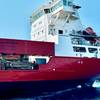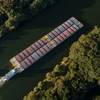Telemedicine on Largest Italian PV
The project, which is the result of the collaboration between Telesal, Costa Cruises, Genoa’s Galliera Hospital, the C.I.R.M. and D’Apollonia, has premiered at the Telemedicine Conference in Rome.
The experimental phase, which will be carried out on board the Italian line’s flagship Costa Concordia starting in early 2009, will enable the future real-time delivery of clinical care 24 hours a day even on the high seas.
Europe’s first ever experiment in maritime telemedicine on board a large passenger ship has premiered at the Telemedicine Conference held at Rome’s Ospedale San Giovanni Calibita, Fatebenefratelli.
The project is the result of the collaboration between Italy and Europe’s number one cruise line Costa Cruises, TELESAL – Telecomunicazioni per la salute (Telecommunication for Health), Genoa’s Galliera Hospital, the Genoese engineering company D’Appolonia and the C.I.R.M. (Centro Internazionale Radio Medico, or International Radio Medical Center).
TELESAL will bring on board Costa’s ships a telemedicine suite enabling enhanced health care with advanced medical technology around the clock in the sea-going environment. The experimentation will commence in the early months of 2009 on the Costa Concordia, the largest Italian passenger vessel and the flagship (together with the sister ship Costa Serena). The broadband satellite system has already been installed on the Costa Concordia, and the final steps are currently being taken for the configuration of the telemedicine suite and training of the personnel involved in the project.
Experimentation will begin in early 2009, when the ship is deployed on 10- and 11-day cruises to Greece, Turkey, Egypt and Cyprus. This phase will be highly significant for the project insofar as it will be conducted on the largest Italian passenger ship, accommodating each week around 3800 Guests of all ages from many different countries, as well as the crew of 1000.
The assistance provided on board by the new service will be able to ensure diagnosis and consultation at a distance in relation to first aid, toxicology, cardiology, radiology, dermatology and ophthalmology with the collaboration of Genoa’s Galliera Hospital, and the coordination of the hospital’s general medicine, surgery & emergency department, headed by Dr. Paolo Cremonesi, with the support of its IT & Telecommunications Services, under the direction of the Galliera Health Authority. The innovative new service will consist of an exchange of medical data (experimentation will include dermatological, ophthalmology and radiological images, electrocardiograms, scans), which can be shared thanks to video-conferencing so as to enable real-time consultation between the shipboard medical personnel and the Galliera health professionals.
“It is part of our mission to be at the forefront in all aspects of our activity, so we can’t help feeling proud to contribute to the first experiment in telemedicine at sea,” announced Costa Cruises President Gianni Onorato. “This is a highly innovative and extremely important project; the aim of this European first is to further enhance the quality of the service for our Guests and crew. For this reason we’ve decided to launch the experimentation on our flagship Costa Concordia. We hope in the future to be able to extend the telemedicine installation project with fleetwide deployment and the involvement of hospitals around the world.”
“Telesal has been devised and developed specifically to provide remote consulting even in the most extreme environments and situations,” said TELESAL project leader Cesare Aragno. “Our technology and experience enable us to deliver medical assistance not only at sea but also in space, in remote areas in the same way as for the ill and the elderly in their homes. Now though, this collaboration with Costa Cruises is a turning point for us because it will allow us to disseminate telemedicine not merely as a medical solution for emergencies or serious illness but also as a guarantee for people who are simply relaxing on vacation.”
“We joined this project with enthusiasm,” said Galliera General Director Adriano Lagostena. “It’s an important step forward in terms of health care organization and it falls within the strategic directives of the Hospital regarding the creation of integrated systems in networks that are not only structural but above all functional. And it should be stressed that the realization of this ambitious project will allow the ‘global’ provision of health services, thanks to the partnership of Italian firms, thus confirming Italy’s role at the cutting edge of enterprise.”
“The experience brought by the C.I.R.M., which has been giving radio medical assistance to seafarers for more than 70 years and intervened in some 1850 cases last year alone,” added Sergio Pillon, Medical Director of the CIRM and Telemedicine Director of Rome’s San Camillo-Forlanini Specialist Emergency Medical Center, “combined with the new technology supplied by Telesal will enable the provision of specialized consultation for people at sea. When there are ship’s doctors on board, they will continue to operate and – thanks to this advanced technology – they will be able to guarantee expert assistance and specialized treatments even when the vessel is far from port. This is a unique experiment in Italy, and one that will bring important benefits not only to the Costa fleet but to Italian shipping as whole in terms of health protection and saving lives at sea, with the development of specialized Italian telemedicine services available at sea around the world.”
(www.costa.it)










